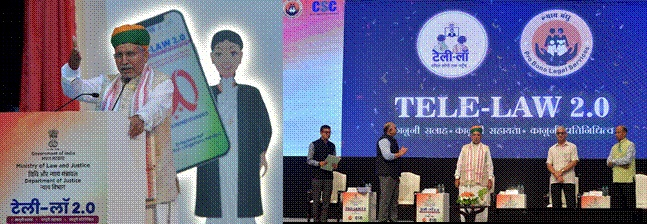Description

Copyright infringement not intended
Picture Courtesy: PIB
Context: The Union Minister of Law and Justice launched the Tele-Law 2.0 initiative, a revamped version of the Tele-Law programme that aims to provide free legal aid to the rural and marginalised sections of society through video conferencing.
Key Highlights
- The launch of Tele-Law 2.0 marks a significant advancement in the Tele-Law program, which operates under the DISHA Scheme by the Department of Justice, Ministry of Law & Justice. This new iteration represents an evolution of the program to better serve citizens' legal needs.
- The Tele-Law program reached a noteworthy milestone by successfully delivering 50 lahks (5 million) in legal consultations. This achievement underscores the program's commitment to making justice accessible to every corner of the country.
- The integration between Tele-Law and Nyaya Bandhu pro bono legal services was formally unveiled during the event. This integration aims to create a direct link between individuals seeking legal aid and pro bono advocates, facilitating a seamless process for accessing legal support.

Tele-Law
About
- Tele-Law is an initiative launched by the Government of India to provide legal assistance and advice to citizens, especially those residing in rural and remote areas, who have limited access to legal services. The initiative aims to bridge the gap between citizens and legal professionals through technology.
Key features of the Tele-Law initiative
- Remote Access: Tele-Law utilizes telecommunications and digital platforms to enable citizens, regardless of their location, to access legal advice and consultations. This remote access eliminates the need for citizens to physically visit legal offices, which can be challenging for those living in remote or rural areas.
- Legal Aid Clinics: The initiative establishes Legal Aid Clinics in various locations, particularly in rural and underserved areas. These clinics are equipped with video conferencing facilities that enable citizens to interact with lawyers virtually. This setup reduces the need for citizens to travel long distances to seek legal assistance.
- Pro Bono Services: Tele-Law encourages legal professionals to contribute pro bono services, meaning they offer their legal expertise free of charge. This aspect ensures that individuals who cannot afford legal representation can still receive the necessary assistance to address their legal concerns, fostering greater access to justice.
- Legal Awareness: Beyond individual consultations, Tele-Law emphasizes legal awareness and education. It aims to inform citizens about their legal rights, responsibilities, and the legal processes they may encounter. By increasing legal literacy, citizens are better equipped to navigate their legal matters effectively.
- Government Support: Tele-Law receives support from the government, specifically the Department of Justice and Ministry of Law & Justice. This support reflects the government's commitment to providing accessible legal services to all citizens, regardless of their geographical location or socio-economic status.
Significance of the Tele-Law Initiative
- Access to Justice: Tele-law plays a critical role in addressing the geographical imbalance in access to legal services. Utilizing technology to offer legal consultations and advice ensures that citizens in remote and underserved areas, who might otherwise face significant barriers to accessing legal help, can receive the assistance they need. This greater access contributes to a more equitable distribution of justice services across the nation.
- Empowerment: The initiative goes beyond providing immediate legal solutions. By informing citizens about their legal rights, responsibilities, and available options, Tele-Law empowers individuals to make informed decisions about their legal matters. This empowerment leads to better outcomes and increased confidence when dealing with legal issues, ultimately promoting a more knowledgeable citizenry.
- Reducing Backlog: Timely resolution of legal issues through Tele-Law contributes to reducing the backlog of cases in the judicial system. By addressing legal concerns at an early stage, the initiative prevents issues from escalating into more complex disputes that may burden the courts. This alleviation of the judicial load supports a more efficient and effective justice system.
- Efficiency: Tele-law leverages technology to streamline the delivery of legal services. By connecting lawyers and clients remotely, the initiative optimizes the use of resources and reduces the need for physical travel. This efficiency benefits both legal professionals and citizens, allowing them to engage in legal consultations without the constraints of time and distance.
Key steps taken by India to implement the Tele-Law initiative
- Tele-Law Launch: The inception of Tele-Law took place as a pilot scheme in 2017 under the Access to Justice Project. This pilot phase allowed the initiative to be tested and refined, assessing its feasibility and effectiveness in delivering legal services to citizens through technology.
- Common Service Centers (CSCs): Tele-Law utilizes Common Service Centers (CSCs) as a strategic point of delivery for legal services. These centres, often located in rural and remote areas, serve as hubs where citizens can access various government and public services. Through video conferencing facilities at these centres, citizens can connect with legal professionals for consultations and advice.
- Expansion to Rural Areas and Local Languages: Building on the initial success of the pilot phase, Tele-Law was expanded to include more rural and underserved areas. This expansion aimed to ensure that even the most remote regions could benefit from the initiative. Additionally, providing legal services in local languages enhances accessibility and comprehension for citizens who might not be fluent in English.
- Integration with Pro Bono Legal Services: Recognizing the importance of collaboration and synergies, Tele-Law was integrated with other pro bono legal services, such as Nyaya Bandhu. This integration aims to leverage the strengths of various initiatives, enhancing their collective impact and widening their reach. By merging resources and efforts, the initiative can better address the legal needs of citizens.
Challenges associated with the implementation of the Tele-Law initiative
- Digital Divide: In areas with limited internet access and low digital literacy, citizens may struggle to fully participate in Tele-Law services. Uneven distribution of technological infrastructure and resources can hinder the initiative's goal of providing equal access to legal services for all citizens.
- Quality Assurance: Ensuring the quality, accuracy, and credibility of legal advice provided through Tele-Law is vital. Legal professionals must uphold professional standards and provide accurate guidance. Striking a balance between remote consultations and maintaining the quality of advice poses a challenge.
- Sustainability: The long-term sustainability of Tele-Law requires consistent support from both the government and stakeholders. This includes funding, technological infrastructure maintenance, and continued training for legal professionals and support staff. Ensuring Tele-Law's continued operation beyond the initial phases is a challenge that needs ongoing attention.
- Cultural Sensitivity: India's diverse cultural and legal landscape requires legal professionals to be sensitive to local customs, traditions, and regional laws. Effective legal advice should consider the nuances of different communities. Providing advice that aligns with local norms and values is important for building trust and ensuring effective legal solutions.
Addressing these challenges requires a multi-faceted approach that involves collaboration with various stakeholders, investments in digital infrastructure, training programs for legal professionals, ongoing assessment of quality, and maintaining a focus on cultural sensitivity. Overcoming these challenges will contribute to the initiative's success in delivering equitable legal services to citizens across the country.
Way Forward
- Digital Infrastructure: Investing in and improving digital infrastructure, including internet connectivity and access to technology, is crucial to ensure that citizens in remote areas can easily access Tele-Law services. Government efforts, partnerships, and technological innovations can play a role in bridging the digital divide.
- Training: Providing training for legal professionals in handling remote consultations, using technology effectively, and maintaining professional standards in virtual interactions is essential. Ongoing skill development can enhance the quality of legal advice provided through Tele-Law.
- Awareness: Creating awareness among citizens about the existence and benefits of Tele-Law is important. Government campaigns, community outreach, and collaborations with local leaders can help inform people about the availability of legal services and how to access them.
- Collaboration: Collaborating with NGOs, legal institutions, bar associations, and other stakeholders can expand the reach and impact of Tele-Law. These partnerships can help pool resources, share expertise, and ensure a broader network of support for the initiative.
- Feedback Mechanism: Establishing feedback mechanisms allows users of Tele-Law services to provide input about their experiences. This feedback can help identify areas for improvement, address challenges, and enhance the overall quality and effectiveness of the initiative.
By focusing on these steps, Tele-Law can continue to evolve as a responsive, efficient, and accessible platform for legal services. Adapting to technological advancements, promoting professional development, and engaging with the community will contribute to its long-term success in delivering justice to all citizens, regardless of their location or background.
.jpg)
Conclusion
- Tele-Law is an innovative project that uses technology to make legal services more accessible, especially in areas where they are scarce. It faces some difficulties, but it also has a lot of potential to improve access to justice and legal empowerment for the people of India. Tele-law can overcome these difficulties and build on its achievements to keep contributing to the legal access of all citizens in India.
Must Read Articles:
TELE LAW PROGRAM: https://www.iasgyan.in/daily-current-affairs/tele-law-program
INITIATIVES TO PROVIDE CITIZEN-CENTRIC DELIVERY OF LEGAL SERVICES: https://www.iasgyan.in/daily-current-affairs/initiatives-to-provide-citizen-centric-delivery-of-legal-services
|
PRACTICE QUESTION
Q. What is the Tele-Law initiative, and what is its significance in the context of legal services accessibility? What are the main challenges associated with its implementation, and what steps can be taken to address these challenges and pave the way forward for the initiative's continued success?
|
https://pib.gov.in/PressReleasePage.aspx?PRID=1952225










